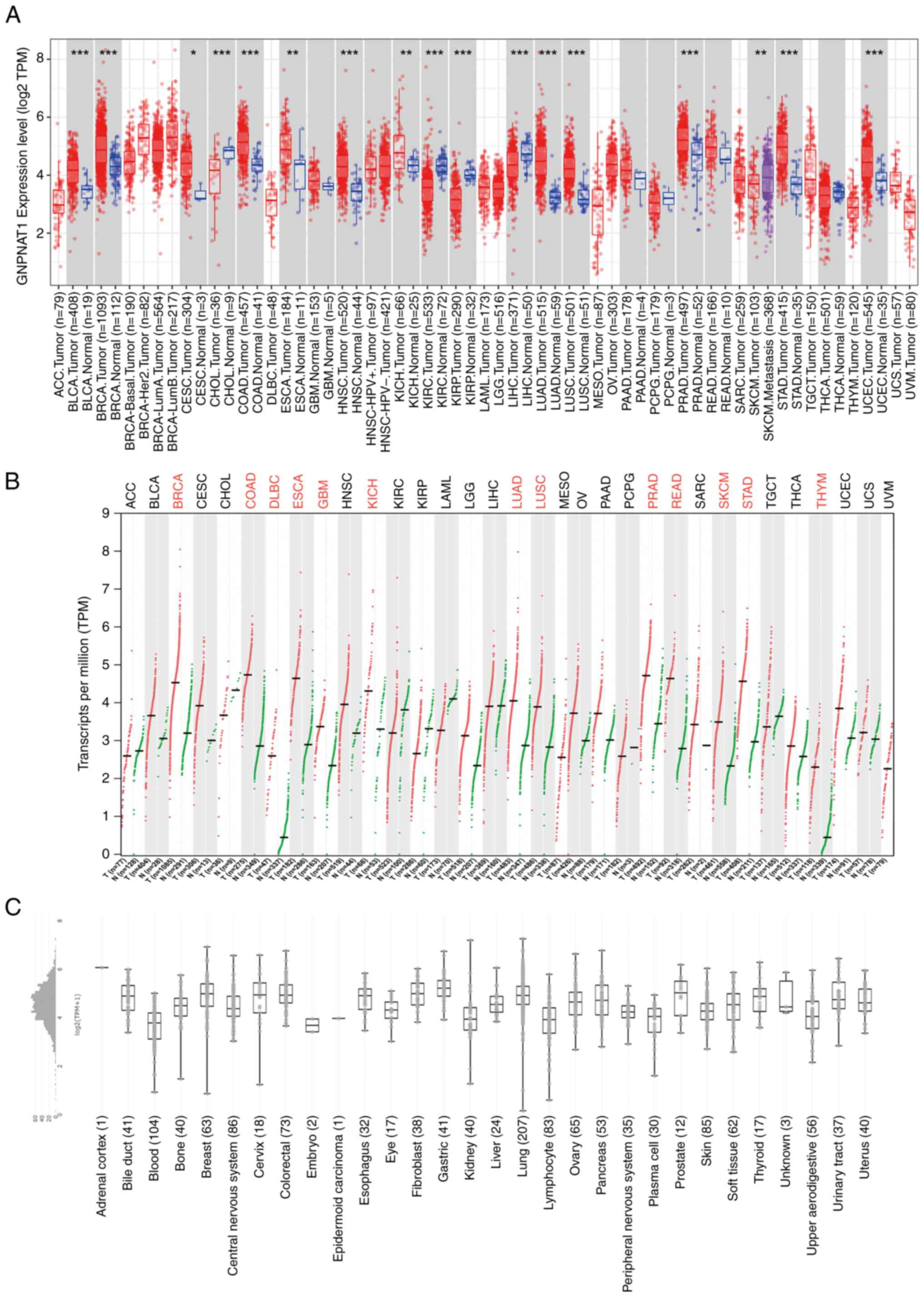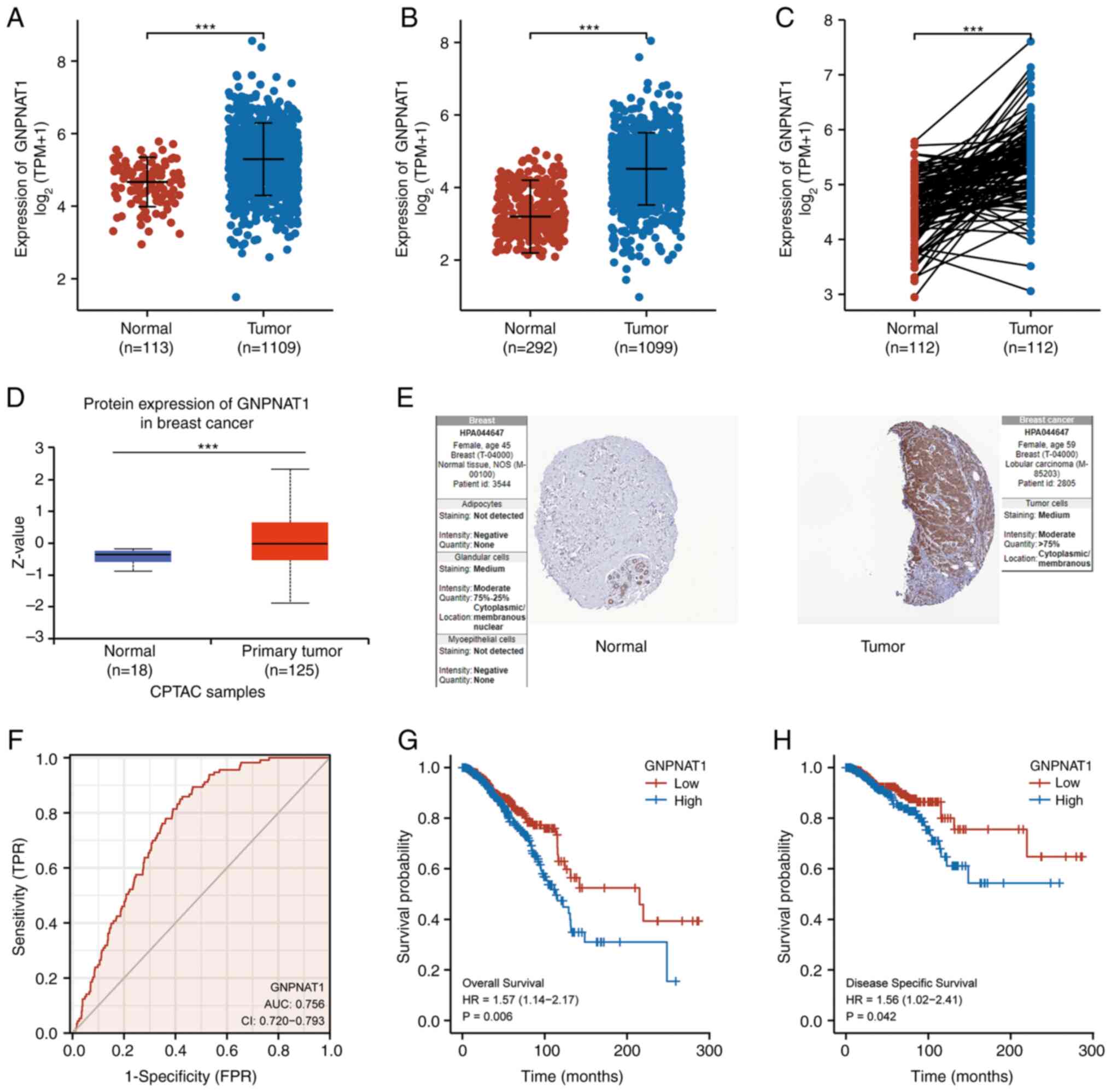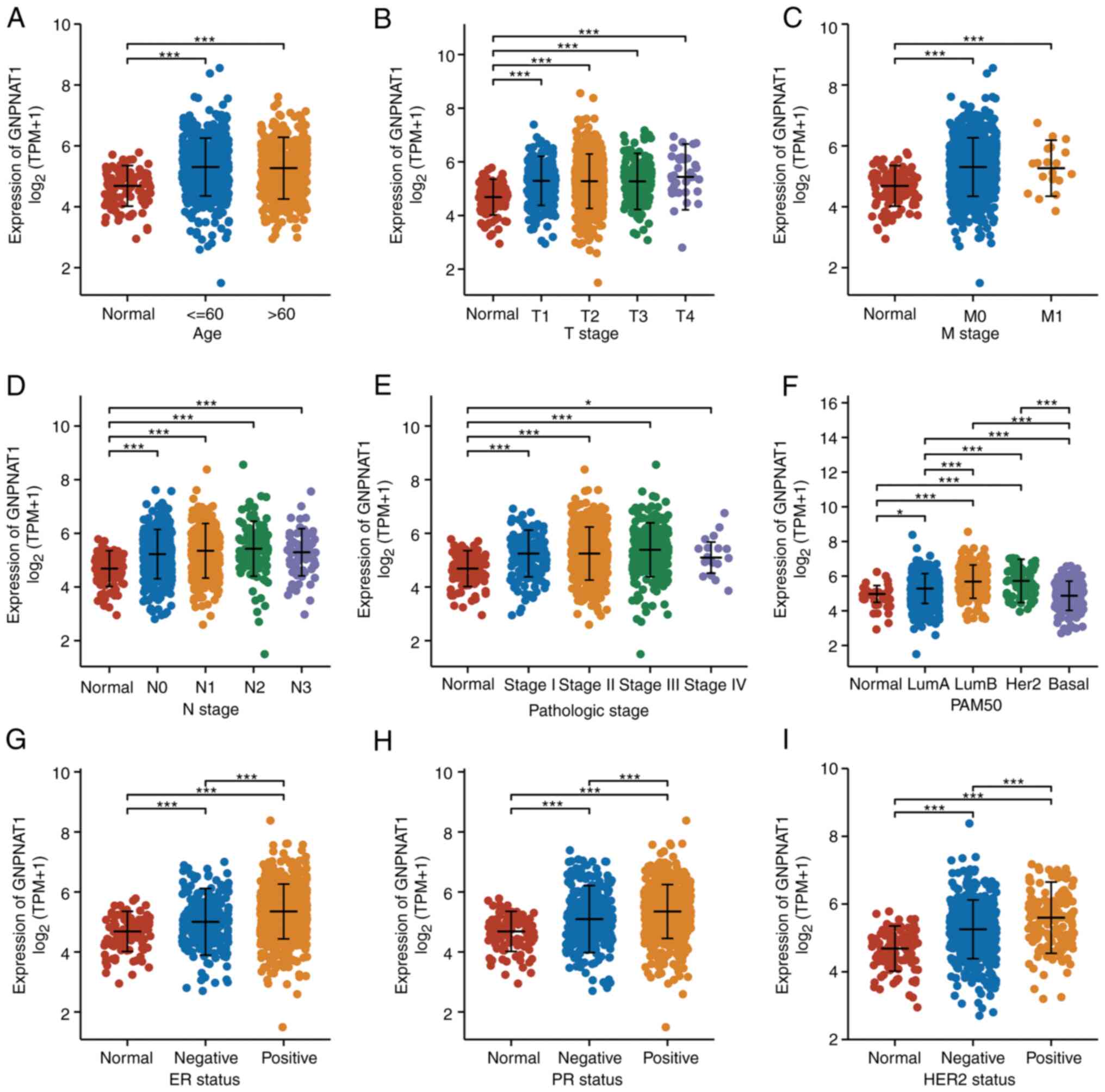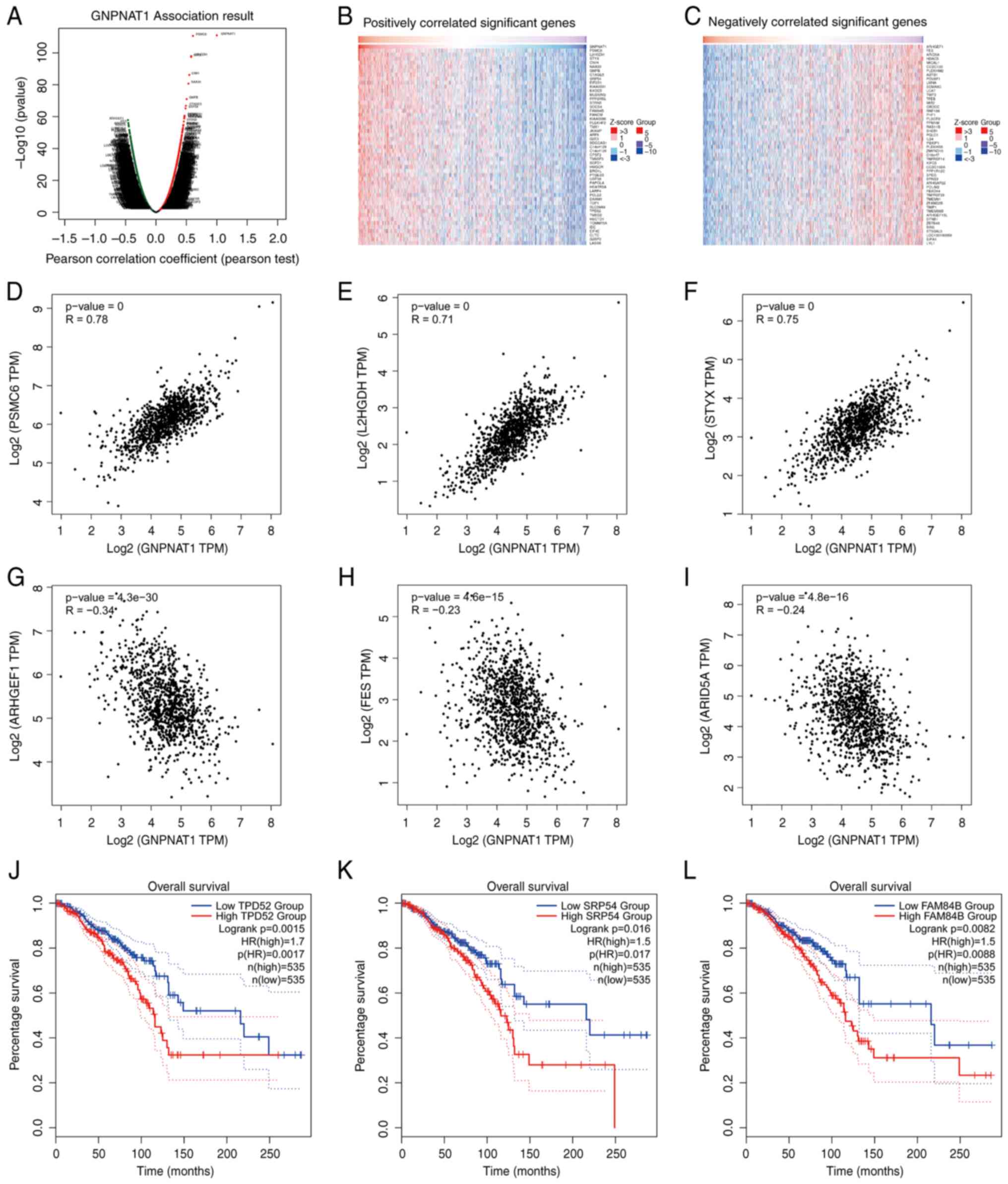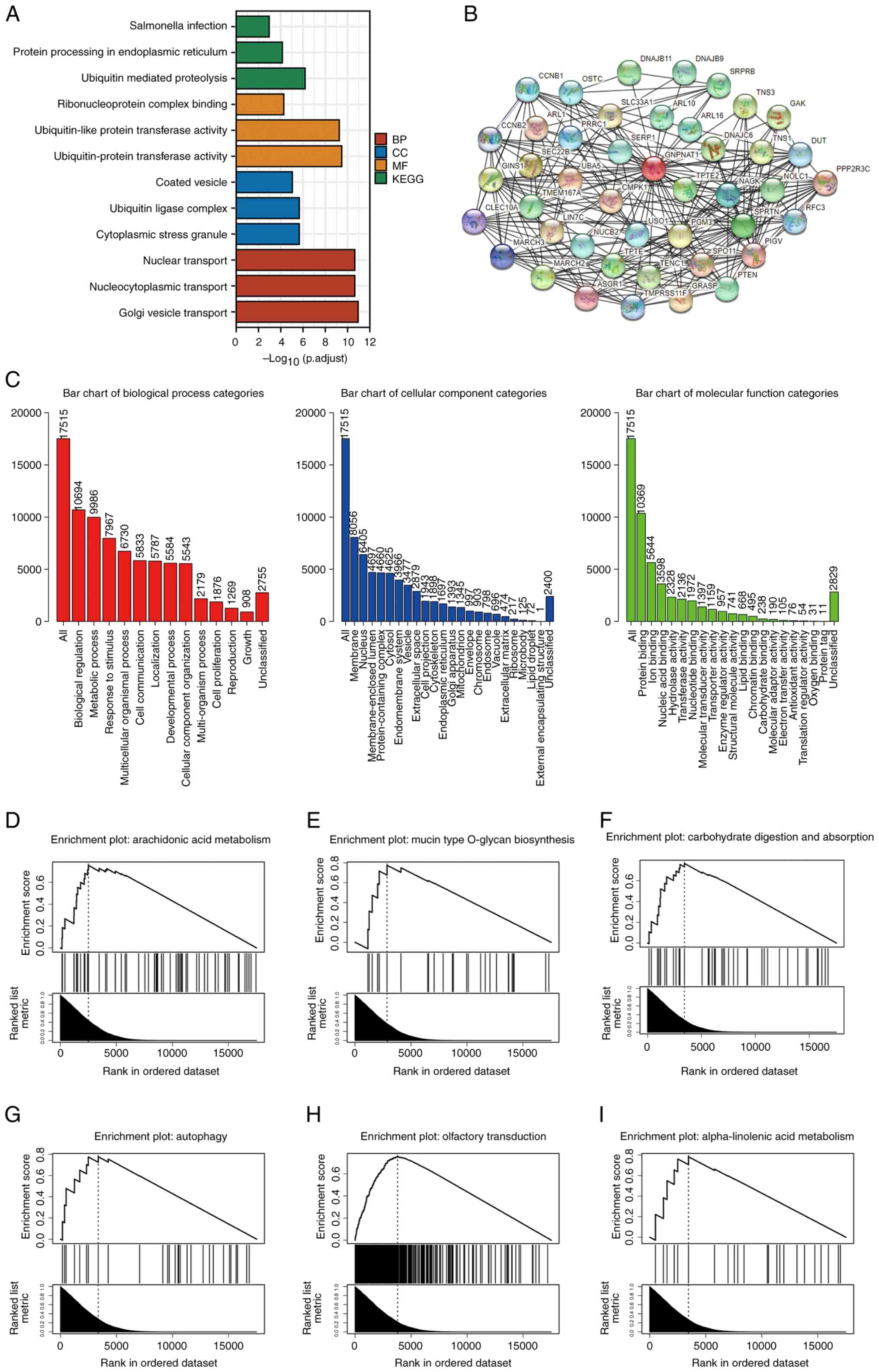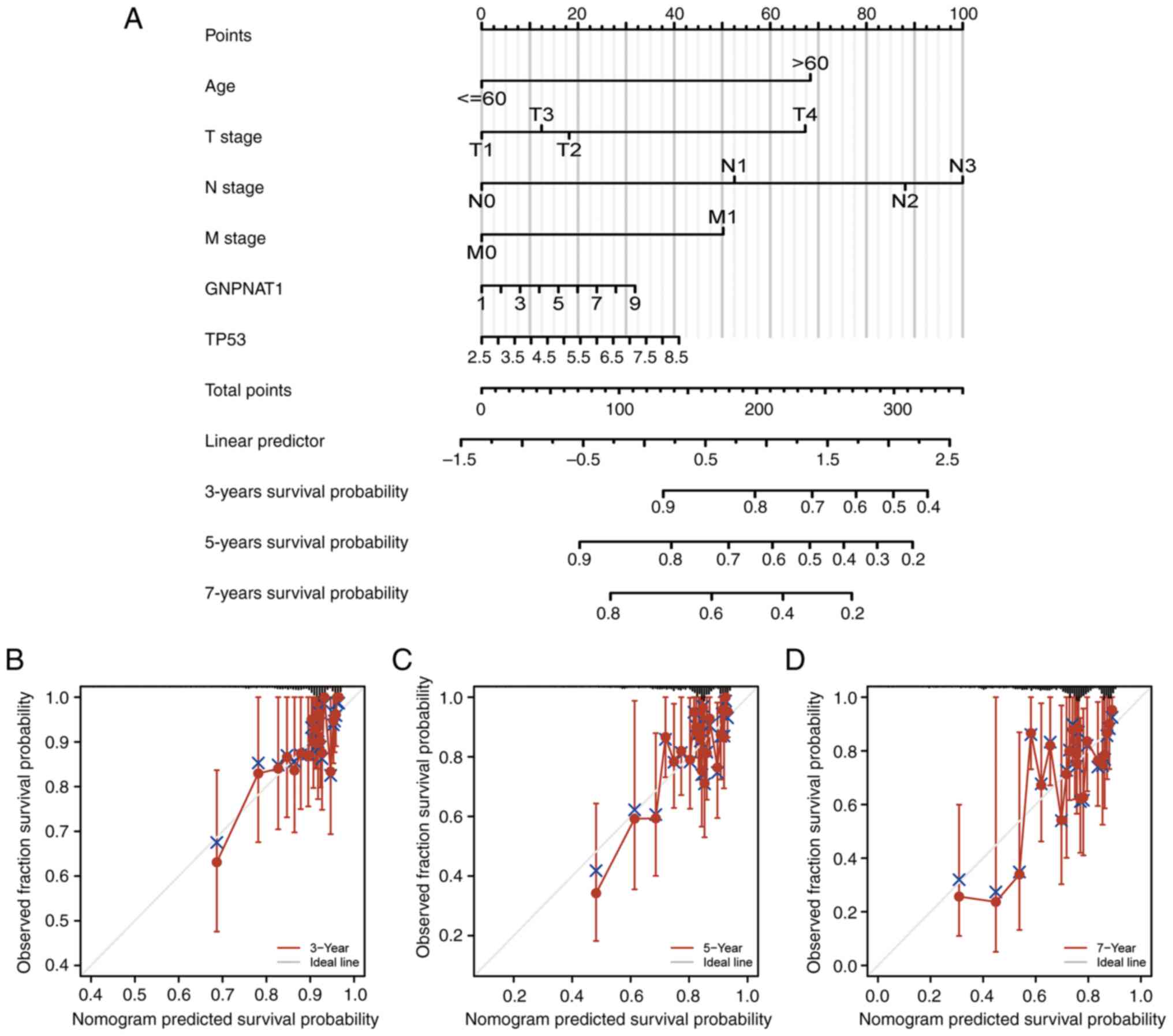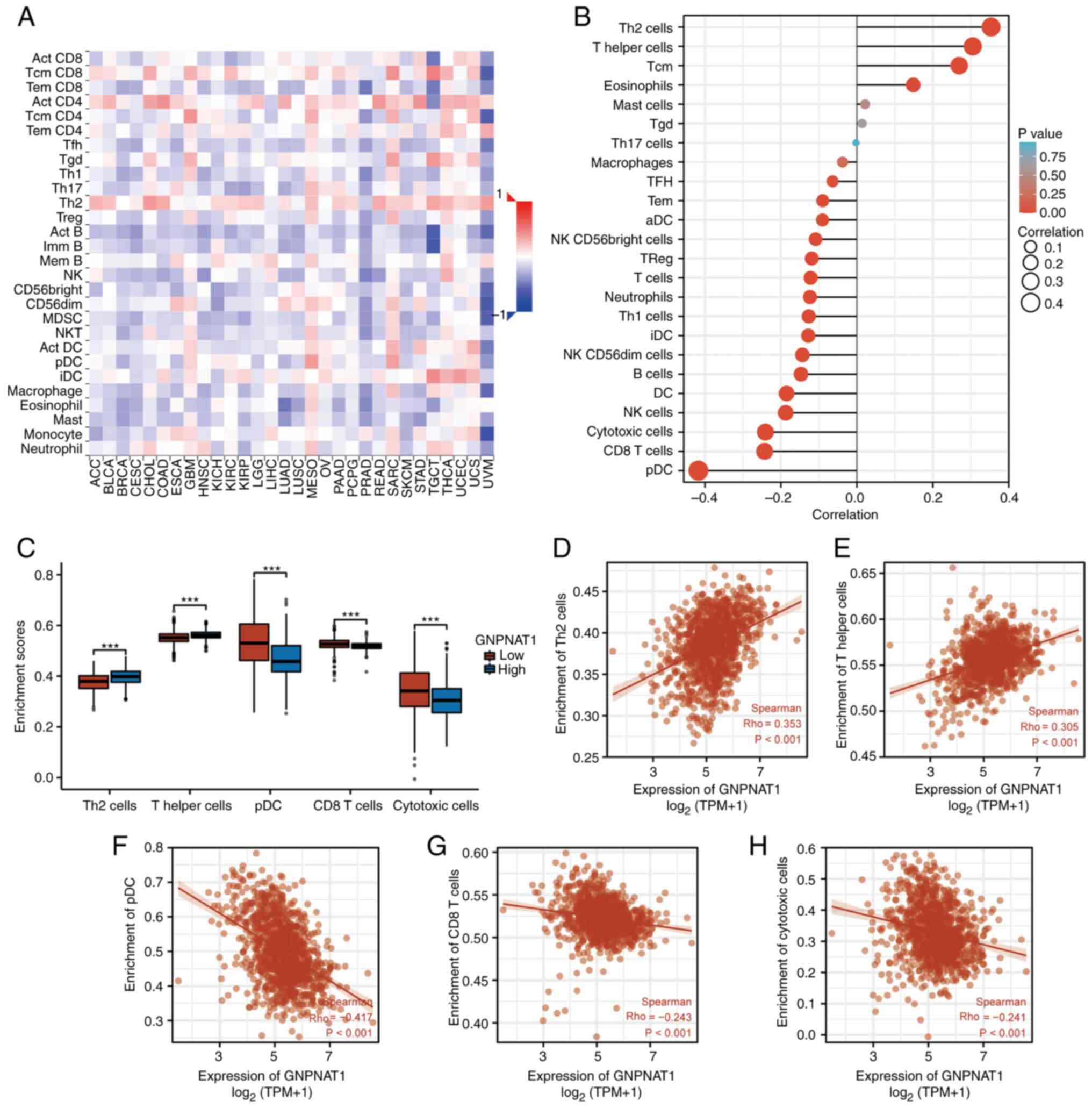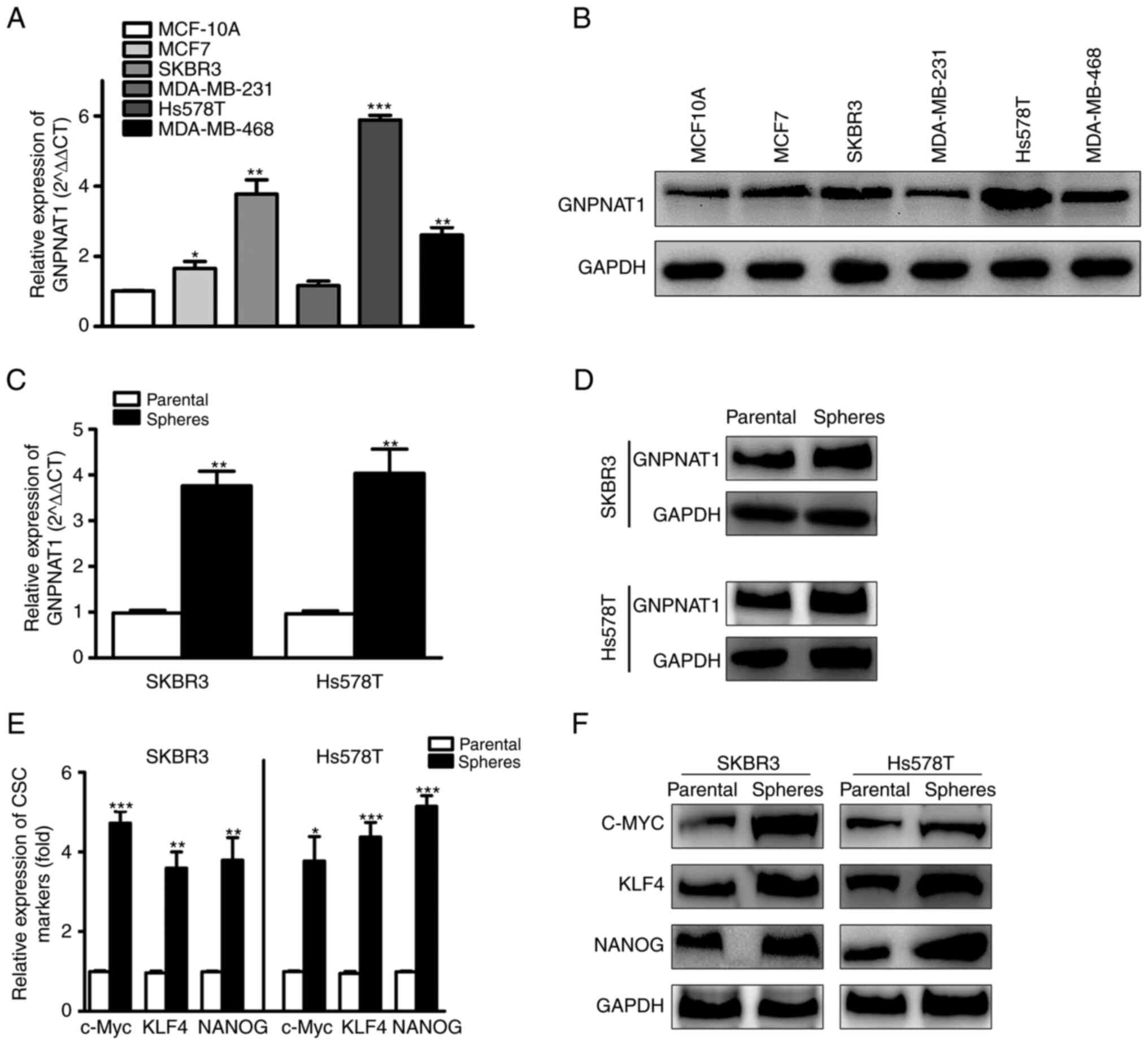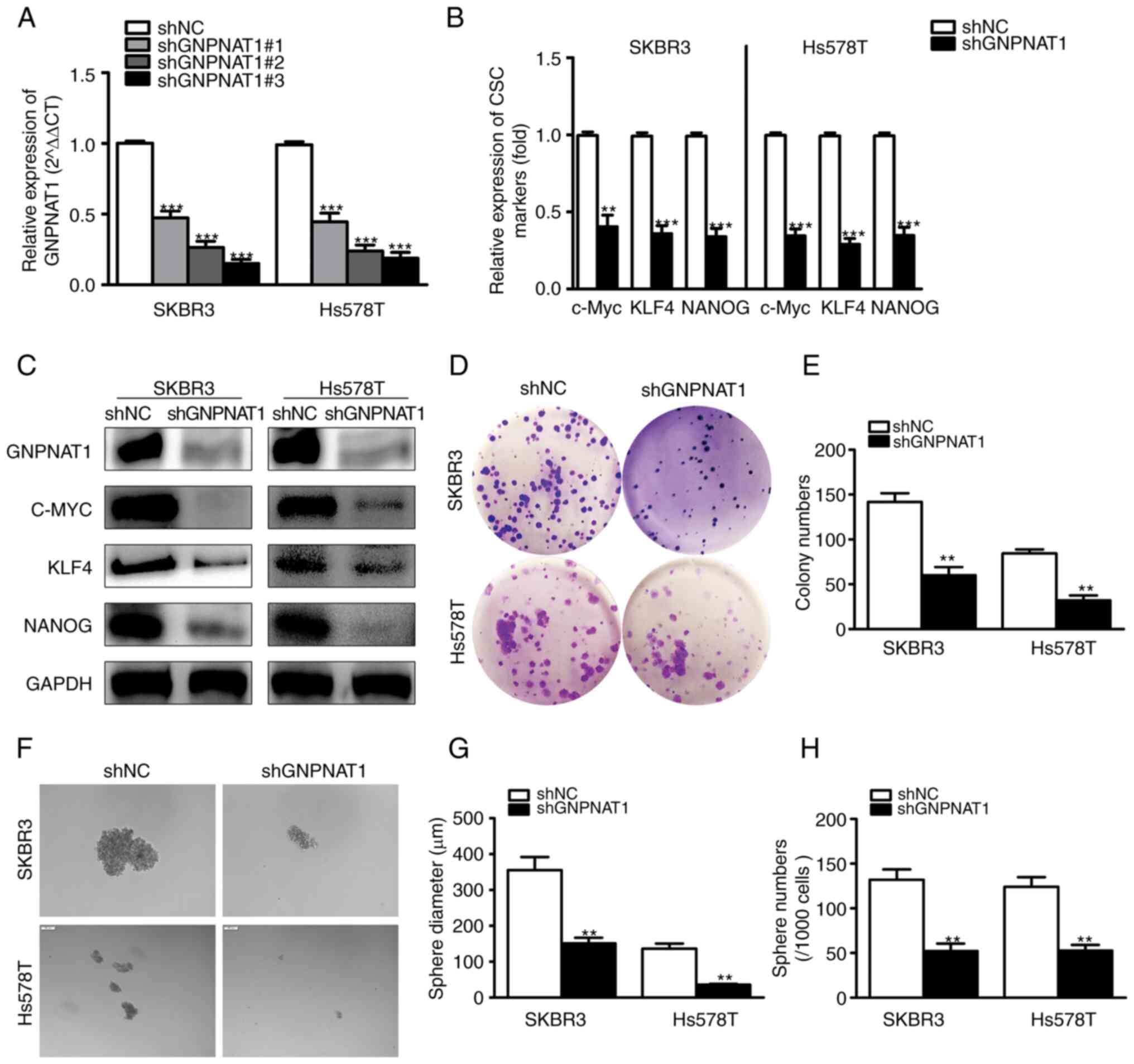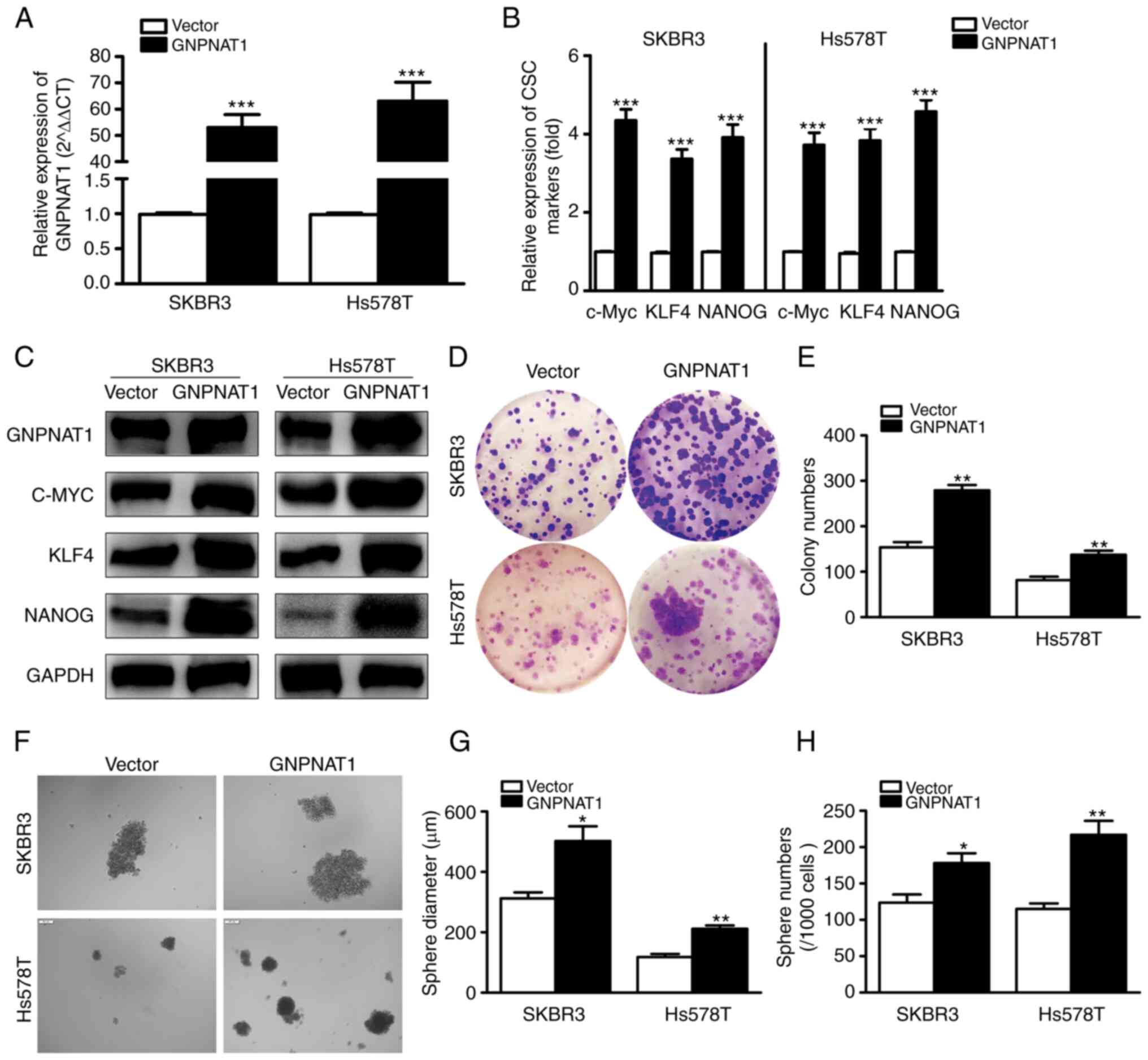|
1
|
Sung H, Ferlay J, Siegel RL, Laversanne M,
Soerjomataram I, Jemal A and Bray F: Global Cancer Statistics 2020:
GLOBOCAN estimates of incidence and mortality worldwide for 36
cancers in 185 countries. CA Cancer J Clin. 71:209–249. 2021.
View Article : Google Scholar : PubMed/NCBI
|
|
2
|
Zhu J, Wu G, Zhao Y, Yang B, Chen Q, Jiang
J, Meng Y, Ji S and Gu K: Epidemiology, treatment and prognosis
analysis of small cell breast carcinoma: A population-based study.
Front Endocrinol (Lausanne). 13:8023392022. View Article : Google Scholar : PubMed/NCBI
|
|
3
|
Harbeck N and Gnant M: Breast cancer.
Lancet. 389:1134–1150. 2017. View Article : Google Scholar : PubMed/NCBI
|
|
4
|
Duffy MJ, Walsh S, McDermott EW and Crown
J: Biomarkers in breast cancer: Where are we and where are we
going? Adv Clin Chem. 71:1–23. 2015. View Article : Google Scholar : PubMed/NCBI
|
|
5
|
Bao Z, Cheng J, Zhu J, Ji S, Gu K, Zhao Y,
Yu S and Meng Y: Using weighted gene co-expression network analysis
to identify increased MND1 expression as a predictor of poor breast
cancer survival. Int J Gen Med. 15:4959–4974. 2022. View Article : Google Scholar : PubMed/NCBI
|
|
6
|
Deng M, Xiong C, He ZK, Bin Q, Song JZ, Li
W and Qin J: MCTS1 as a novel prognostic biomarker and its
correlation with immune infiltrates in breast cancer. Front Genet.
13:8259012022. View Article : Google Scholar : PubMed/NCBI
|
|
7
|
Rajarajan D, Kaur B, Penta D, Natesh J and
Meeran SM: miR-145-5p as a predictive biomarker for breast cancer
stemness by computational clinical investigation. Comput Biol Med.
135:1046012021. View Article : Google Scholar : PubMed/NCBI
|
|
8
|
Elhossini RM, Ahmed HA, Otaify G, Ghorab
RM, Amr K and Aglan M: A novel variant in GNPNAT1 gene causing a
spondylo-epi-metaphyseal dysplasia resembling PGM3-Desbuquois like
dysplasia. Am J Med Genet A. 188:2861–2868. 2022. View Article : Google Scholar : PubMed/NCBI
|
|
9
|
Sabbagh Q, Alkar F, Patte K, Prodhomme O,
Janel C, Touraine R, Jeandel C and Geneviève D: A second individual
with rhizomelic spondyloepimetaphyseal dysplasia and homozygous
variant in GNPNAT1. Eur J Med Genet. 65:1044952022. View Article : Google Scholar : PubMed/NCBI
|
|
10
|
Ain NU, Baroncelli M, Costantini A, Ishaq
T, Taylan F, Nilsson O, Mäkitie O and Naz S: Novel form of
rhizomelic skeletal dysplasia associated with a homozygous variant
in GNPNAT1. J Med Genet. 58:351–356. 2021. View Article : Google Scholar : PubMed/NCBI
|
|
11
|
Kaushik AK, Shojaie A, Panzitt K, Sonavane
R, Venghatakrishnan H, Manikkam M, Zaslavsky A, Putluri V, Vasu VT,
Zhang Y, et al: Inhibition of the hexosamine biosynthetic pathway
promotes castration-resistant prostate cancer. Nat Commun.
7:116122016. View Article : Google Scholar : PubMed/NCBI
|
|
12
|
Bacos K, Gillberg L, Volkov P, Olsson AH,
Hansen T, Pedersen O, Gjesing AP, Eiberg H, Tuomi T, Almgren P, et
al: Blood-based biomarkers of age-associated epigenetic changes in
human islets associate with insulin secretion and diabetes. Nat
Commun. 7:110892016. View Article : Google Scholar : PubMed/NCBI
|
|
13
|
Zhao M, Li H, Ma Y, Gong H, Yang S, Fang Q
and Hu Z: Nanoparticle abraxane possesses impaired proliferation in
A549 cells due to the underexpression of glucosamine 6-phosphate
N-acetyltransferase 1 (GNPNAT1/GNA1). Int J Nanomedicine.
12:1685–1697. 2017. View Article : Google Scholar : PubMed/NCBI
|
|
14
|
Zheng X, Li Y, Ma C, Zhang J, Zhang Y, Fu
Z and Luo H: Independent prognostic potential of GNPNAT1 in lung
adenocarcinoma. Biomed Res Int. 2020:88514372020. View Article : Google Scholar : PubMed/NCBI
|
|
15
|
Zhang S, Zhang H, Li H, Guo J, Wang J and
Zhang L: Potential role of glucosamine-phosphate
N-acetyltransferase 1 in the development of lung adenocarcinoma.
Aging (Albany NY). 13:7430–7453. 2021. View Article : Google Scholar : PubMed/NCBI
|
|
16
|
Zhu P, Gu S, Huang H, Zhong C, Liu Z,
Zhang X, Wang W, Xie S, Wu K, Lu T and Zhou Y: Upregulation of
glucosamine-phosphate N-acetyltransferase 1 is a promising
diagnostic and predictive indicator for poor survival in patients
with lung adenocarcinoma. Oncol Lett. 21:4882021. View Article : Google Scholar : PubMed/NCBI
|
|
17
|
Liu W, Jiang K, Wang J, Mei T, Zhao M and
Huang D: Upregulation of GNPNAT1 predicts poor prognosis and
correlates with immune infiltration in lung adenocarcinoma. Front
Mol Biosci. 8:6057542021. View Article : Google Scholar : PubMed/NCBI
|
|
18
|
Gupta PB, Fillmore CM, Jiang G, Shapira
SD, Tao K, Kuperwasser C and Lander ES: Stochastic state
transitions give rise to phenotypic equilibrium in populations of
cancer cells. Cell. 146:633–644. 2011. View Article : Google Scholar : PubMed/NCBI
|
|
19
|
Kreso A and Dick JE: Evolution of the
cancer stem cell model. Cell Stem Cell. 14:275–291. 2014.
View Article : Google Scholar : PubMed/NCBI
|
|
20
|
Al-Hajj M, Wicha MS, Benito-Hernandez A,
Morrison SJ and Clarke MF: Prospective identification of
tumorigenic breast cancer cells. Proc Natl Acad Sci USA.
100:3983–3988. 2003. View Article : Google Scholar : PubMed/NCBI
|
|
21
|
Charafe-Jauffret E, Ginestier C, Bertucci
F, Cabaud O, Wicinski J, Finetti P, Josselin E, Adelaide J, Nguyen
TT, Monville F, et al: ALDH1-positive cancer stem cells predict
engraftment of primary breast tumors and are governed by a common
stem cell program. Cancer Res. 73:7290–7300. 2013. View Article : Google Scholar : PubMed/NCBI
|
|
22
|
Chandrashekar DS, Karthikeyan SK, Korla
PK, Patel H, Shovon AR, Athar M, Netto GJ, Qin ZS, Kumar S, Manne
U, et al: UALCAN: An update to the integrated cancer data analysis
platform. Neoplasia. 25:18–27. 2022. View Article : Google Scholar : PubMed/NCBI
|
|
23
|
Chandrashekar DS, Bashel B, Balasubramanya
SAH, Creighton CJ, Ponce-Rodriguez I, Chakravarthi BVSK and
Varambally S: UALCAN: A portal for facilitating tumor subgroup gene
expression and survival analyses. Neoplasia. 19:649–658. 2017.
View Article : Google Scholar : PubMed/NCBI
|
|
24
|
Zhang Y, Chen F, Chandrashekar DS,
Varambally S and Creighton CJ: Proteogenomic characterization of
2002 human cancers reveals pan-cancer molecular subtypes and
associated pathways. Nat Commun. 13:26692022. View Article : Google Scholar : PubMed/NCBI
|
|
25
|
Chen F, Chandrashekar DS, Varambally S and
Creighton CJ: Pan-cancer molecular subtypes revealed by
mass-spectrometry-based proteomic characterization of more than 500
human cancers. Nat Commun. 10:56792019. View Article : Google Scholar : PubMed/NCBI
|
|
26
|
Uhlén M, Fagerberg L, Hallström BM,
Lindskog C, Oksvold P, Mardinoglu A, Sivertsson Å, Kampf C,
Sjöstedt E, Asplund A, et al: Proteomics. Tissue-based map of the
human proteome. Science. 347:12604192015. View Article : Google Scholar : PubMed/NCBI
|
|
27
|
Vasaikar SV, Straub P, Wang J and Zhang B:
LinkedOmics: Analyzing multi-omics data within and across 32 cancer
types. Nucleic Acids Res. 46((D1)): D956–D963. 2018. View Article : Google Scholar : PubMed/NCBI
|
|
28
|
Wang J, Vasaikar S, Shi Z, Greer M and
Zhang B: WebGestalt 2017: A more comprehensive, powerful, flexible
and interactive gene set enrichment analysis toolkit. Nucleic Acids
Res. 45((W1)): W130–W137. 2017. View Article : Google Scholar : PubMed/NCBI
|
|
29
|
Ru B, Wong CN, Tong Y, Zhong JY, Zhong
SSW, Wu WC, Chu KC, Wong CY, Lau CY, Chen I, et al: TISIDB: An
integrated repository portal for tumor-immune system interactions.
Bioinformatics. 35:4200–4202. 2019. View Article : Google Scholar : PubMed/NCBI
|
|
30
|
Park SY: Nomogram: An analogue tool to
deliver digital knowledge. J Thorac Cardiovasc Surg. 155:17932018.
View Article : Google Scholar : PubMed/NCBI
|
|
31
|
Hu H, Xiang Y, Zhang XY, Deng Y, Wan FJ,
Huang Y, Liao XH and Zhang TC: CDCA5 promotes the progression of
breast cancer and serves as a potential prognostic biomarker. Oncol
Rep. 48:1722022. View Article : Google Scholar : PubMed/NCBI
|
|
32
|
Livak KJ and Schmittgen TD: Analysis of
relative gene expression data using real-time quantitative PCR and
the 2(−Delta Delta C(T)) Method. Methods. 25:402–408. 2001.
View Article : Google Scholar : PubMed/NCBI
|
|
33
|
Ai L, Mu S, Sun C, Fan F, Yan H, Qin Y,
Cui G, Wang Y, Guo T, Mei H, et al: Myeloid-derived suppressor
cells endow stem-like qualities to multiple myeloma cells by
inducing piRNA-823 expression and DNMT3B activation. Mol Cancer.
18:882019. View Article : Google Scholar : PubMed/NCBI
|
|
34
|
Ma XL, Hu B, Tang WG, Xie SH, Ren N, Guo L
and Lu RQ: CD73 sustained cancer-stem-cell traits by promoting SOX9
expression and stability in hepatocellular carcinoma. J Hematol
Oncol. 13:112020. View Article : Google Scholar : PubMed/NCBI
|
|
35
|
Aquino-Gil M, Pierce A, Perez-Cervera Y,
Zenteno E and Lefebvre T: OGT: A short overview of an enzyme
standing out from usual glycosyltransferases. Biochem Soc Trans.
45:365–370. 2017. View Article : Google Scholar : PubMed/NCBI
|
|
36
|
Furuta E, Okuda H, Kobayashi A and Watabe
K: Metabolic genes in cancer: Their roles in tumor progression and
clinical implications. Biochim Biophys Acta. 1805:141–152.
2010.PubMed/NCBI
|
|
37
|
Olivier-Van Stichelen S, Drougat L,
Dehennaut V, El Yazidi-Belkoura I, Guinez C, Mir AM, Michalski JC,
Vercoutter-Edouart AS and Lefebvre T: Serum-stimulated cell cycle
entry promotes ncOGT synthesis required for cyclin D expression.
Oncogenesis. 1:e362012. View Article : Google Scholar : PubMed/NCBI
|
|
38
|
Usui T, Sakurai M, Enjoji S, Kawasaki H,
Umata K, Ohama T, Fujiwara N, Yabe R, Tsuji S, Yamawaki H, et al:
Establishment of a novel model for anticancer drug resistance in
three-dimensional primary culture of tumor microenvironment. Stem
Cells Int. 2016:70538722016. View Article : Google Scholar : PubMed/NCBI
|















